#johann gottlieb fichte
Text
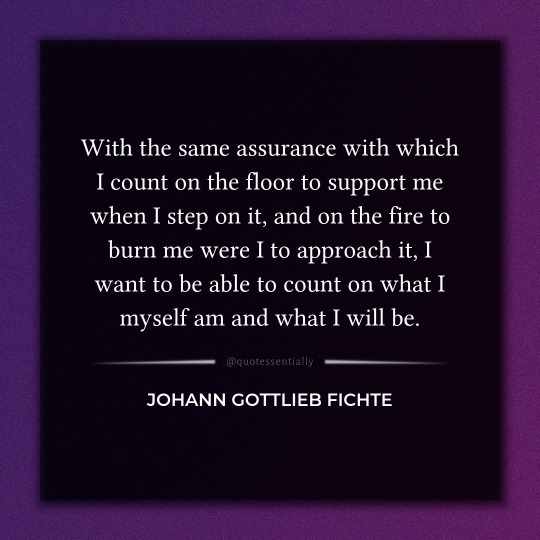
From Johann Gottlieb Fichte’s The Vocation of Man
9 notes
·
View notes
Text

#philosophy#quotes#Johann Gottlieb Fichte#Collected Works#Fichte#mind#thinking#independence#solitude#wisdom
3 notes
·
View notes
Text
Before I start a new book, I usually pore through it to see if I like it enough. This time it's Andrea Wulf's Magnificent Rebels, about the Jena Romantics. It looks very good, and she did an interview over on the podcast "The Rest is History" about it, titled "Germans Behaving Badly".
But then there are the chapter titles: The first is titled "'A happy event' Summer 1794: Goethe and Schiller". That sounds like the beginning of a Schoethe rom-com. Something tells me I'll be getting a fare share of slander about my OTP here.
Chapter 5 is "'Philosophy is originally a feeling' Summer 1796: Novalis in Love" and if that doesn't get me all warm and fuzzy about our boy Fritz and his wholesomeness, I don't know what does.
Chapter 6 (part of the title anyway) is "The Schlegels Arrive" which is funny for some reason.
Then there's Scandals Parts One and Two. AKA German Romanticism is a soap opera.
Which it was.
Long story short, I think I'm going to love this book as will all my mutuals, especially the Schoethe enthusiasts and other fans of this movement.
@poesia-storica @maybe-today-satan @karl-von-moor-official @noturbysshe @keo6232 @apfelhalm @mike-the-jewel @smash-schoetheisreal @eolewyn1010 @fanpersoningfox that means all of you
#johann wolfgang von goethe#friedrich von schiller#alexander von humboldt#johann gottlieb fichte#friedrich von hardenberg#friedrich schlegel#every other one of these guys#schoethe#german romanticism#novalis speaks
23 notes
·
View notes
Text
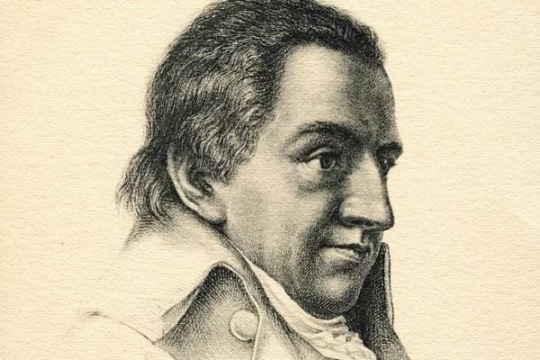
«Y especialmente todos vosotros, que tenéis fuerzas para ello, declarad la guerra más implacable a aquello que es el primer prejuicio del que se siguen todos nuestros males, a aquella que es la fuente ponzoñosa de toda nuestra miseria: al principio según el cual la misión del príncipe es velar por nuestra felicidad. Perseguidlo con el sistema entero de nuestro saber por todos los escondrijos en los que se ha ocultado, hasta que sea exterminado de la tierra y devuelto al infierno que es de donde vino. El principio dice que nosotros no sabemos lo que promueve nuestra felicidad, lo sabe el príncipe y es él quien tiene que guiarnos hasta ella, por eso tenemos que seguir a nuestro guía con los ojos cerrados. El hace con nosotros lo que quiere, y si le preguntamos, nos asegura bajo su palabra que eso es necesario para nuestra felicidad. Pone la soga en torno al cuello de la humanidad y grita: “Calma, calma, es todo por vuestro bien”.
No, príncipe, tú no eres nuestro Dios. De El esperamos la felicidad, de ti la protección de nuestros derechos. Con nosotros, no debes ser bondadoso, debes ser justo.»
Johann Gottlieb Fichte: «Reivindicación de la libertad de pensamiento», en Reivindicación de la libertad de pensamiento y otros escritos políticos.Tecnos, pág. 12. Madrid, 1986.
TGO
@bocadosdefilosofia
@dias-de-la-ira-1
#fichte#johann gottlieb fichte#reivindicación de la libertad de pensamiento#felicidad#bondad#justicia#prejuicio#príncipe#gobierno#estado#manipulación#manipulación política#escritos políticos#teo gómez otero#filosofía contemporánea#idealismo alemán#función del estado#derechos#derecho
3 notes
·
View notes
Photo
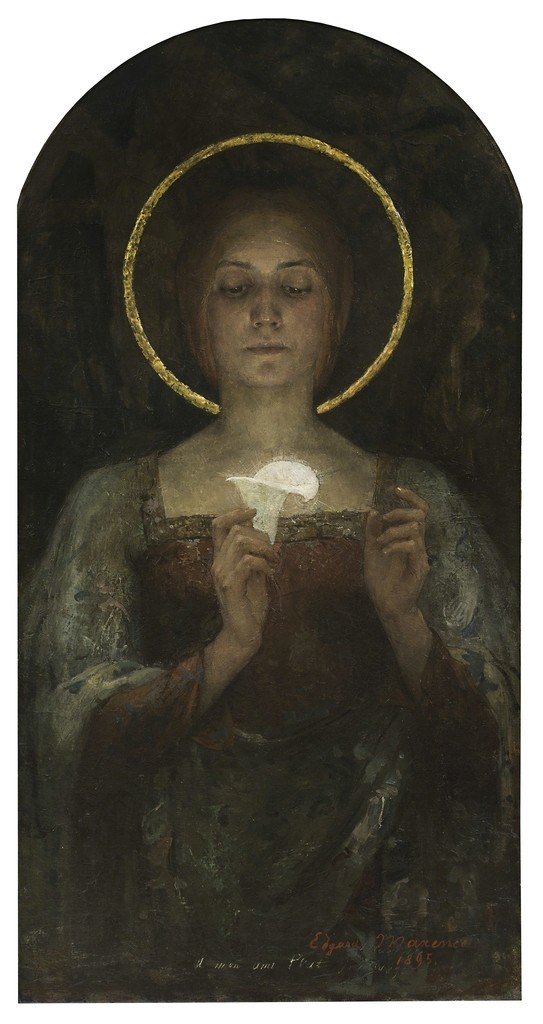
Pureté (Purity) or Saint with Calla Lily by Edgar Maxence (1895)
That which we call heaven does not lie beyond the grave; it is even here diffused around us, and its light arises in every pure heart. My will is mine, and it is the only thing that is wholly mine and entirely dependent on myself; and through it I have already become a citizen of the realm of freedom and of pure spiritual activity. What determination of my will—of the only thing by which I am raised from the dust into this region—is best adapted to its order, is proclaimed to me, at every moment, by my conscience, the bond that constantly unites me to this world;—and it depends solely on myself to give my activity the appointed direction.
—Fichte, The Vocation of Man
The sleep of initiation, which effects the transformation after long, preparatory purification of the astral-body—called catharsis—is quite different: the transmutation of copper (the passions) into gold (purity, eternity).
—Walter J. Stein, The Death of Merlin
See also The Twelve Senses, Forces & World Views
#Edgar Maxence#Christ in Taurus#Capricorn#Pisces#anthroposophy#spiritual science#Fichte#Johann Gottlieb Fichte#Christ in Aries
8 notes
·
View notes
Link
4 notes
·
View notes
Text
Currency of Politics is a well-researched and informative history of money and the (non)politics that govern it.
Originally published 2023-07-09 on my blog
I think money is fascinating. A physical, malleable thing held in your hands. Taking on the form of bills & coins, which themselves carry heavy artistic and symbolic representations of the societies that made them. And yet here in the 21st century, the abstract nature of money as a mere system of account is underlined everyday by the fact that most of our transactions simply involve moving numbers around in a database somewhere. As someone who works as a computer programmer & hears about crypto almost everyday, thinking about the form & structures of money is inescapable.
In my free time I began to read about the history of money & currencies. I find the roots of it in the Mesopotamian collective grain storage system particularly fascinating. It started out as a very simple system, where a farmer could deposit some weight of grain for a token to be redeemed for that same amount of grain at a later date. So when I was listening to the podcast American Prestige last summer and they had a guest on to talk about money, my ears perked up. Their guest, Stefan Eich, was on to discuss his new book The Currency of Politics. When they started discussing the Mesopotamian grain system I knew I had to read the book for myself.
Primarily structured as a historical survey of western philosophical thought regarding money & the politics that surround it, we start with Aristotle (I would expect nothing less from a western philosophical text.) and then climb our way back up through the historical record past Locke, Fichte, Marx, and Keynes before finally taking in the post Bretton Woods status quo.
It is also written as a surprisingly cutting-edge and present text. It is not presented in an evergreen, disconnected philosophical prose but rather as a voice specifically speaking from within the midst of the COVID pandemic and the brewing social and economic unrest that has continued to flow from it.
One of the most important insights of the book that I took away is that money has not always floated above us in a neutral, disconnected manner. In Aristotle’s time, money was very openly grounded in the people. Its very power was connected to the polis that minted it, in the same way that a collective trust and agreement between a group of humans develops language and laws.
He was mostly ambivalent about money though. Seeing the same greed and capacity for wealth hoarding and power development that we can see in our modern society. But with the understanding that its ultimate value came from the same place as laws & language, and thus could be a tool for justice.
Skipping ahead to Keynes, I found the concept & exploration of his bancor particularly interesting and farsighted. It was a supra-national unit of account for international finance, pegged to a basket of common commodities. It was a fair, even headed proposal that could have led to a more equitable and just society.
So of course the US delegation, high off atomic powered victory, rejected it outright in favor of the Bretton Woods system that established the U.S. dollar as the de-facto reserve currency for international finance. At least until that system broke down & was replaced with the current floating exchange rates managed by central banks & backed by the almighty petrodollar.
The majority of the book is spent getting its historical house in order, but I found the most interesting and insightful part of the book to be the forward looking Epilogue. In my experience it is easy for authors to do a historical or literature survey and then just leave it at that. It’s rare to have an author with the courage to ask some questions & even propose solutions!
The three questions that stood out to me were “Who gets to decide who creates money?” “Where should money power reside in our constitutions?” and “Is a more democratic money possible?”
Based on what I read in this book and what I understand about the world, I have to take for granted that the answer to the last question is yes. The alternative is to simply accept that the status quo is the best we can have, and considering its blatant failures in this current moment I don’t believe that is the case nor do I believe that less democratic control of institutions is the answer.
Who gets to decide who creates money is a question that I think is given some good consideration in the epilogue. The idea of creating more seats at the table of governing boards that are accountable to the working class (or really anyone outside the banking industry) seems like a good first step. I will always be skeptical of a bureaucrat who says that inviting people who are not a part of the bureaucracy to look at their work will make things worse in the long run. I’ve been in enough bureaucracies myself to know shirking when I see it.
As for money power and where it belongs in government I feel less clear. I’m not a professional in this space, but I think if there’s one thing this book has made clear it is that not having enough outsiders involved in the process has diminished the potential of our monetary systems. Pages 214-216 of the book give some good jumping off points though if that’s something you’re interested in.
This is an academic work and expects the reader to have some familiarity with the field. The chapter on Marx in particular assumes a familiarity with his Capital texts that occasionally left me feeling lost.
But even with my amateurish status in the field I felt well taken care of and was able to get new information and insights out of it. My only real critique is that the book took me 10 times as long to read as I think it should have, as the end notes contained both citations of texts that I will never read & the juicy asides that I live for and wish had just been footnotes.
It also left me with a couple of questions of my own. First, what would a book like this look like if more women, and non-white/western thinkers had been surveyed? Second, with the book grounding all but the last chapters in the body of a particular person, who is the political theorist who best represents the thinking in the post Bretton Woods world?
Overall the book is an interesting, educating, and insightful primer about the Western political philosophy and approach to money up to the present day. If you have any interest in why money is the way it is or how we got to the modern international financial system we live in, I highly recommend you pick this book up or at least take a listen to the American Prestige interview that started me on this path.
#book review#literature review#political science#currency#history#economics#aristotle#john locke#johann gottlieb fichte#karl marx#john maynard keynes#bretton woods
0 notes
Text
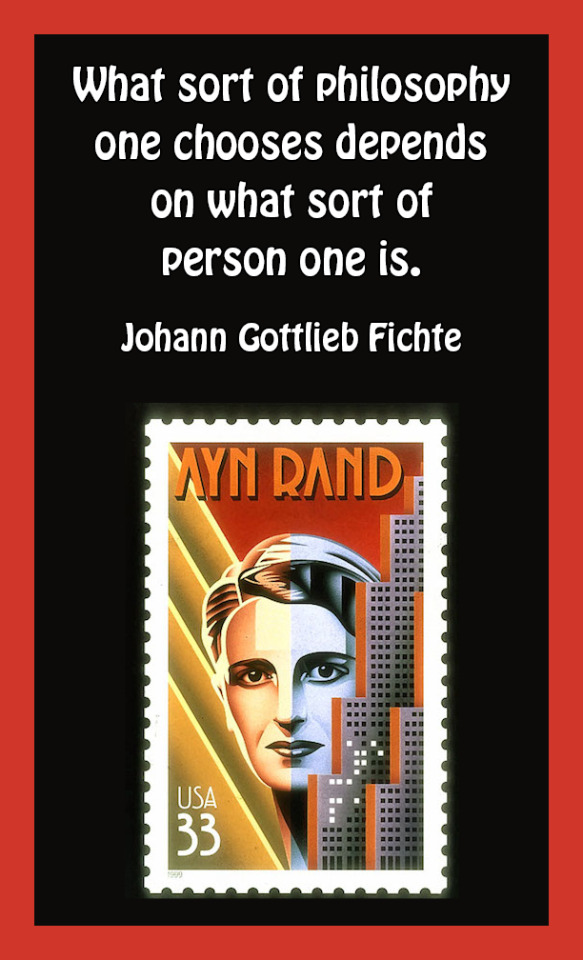
1 note
·
View note
Text
El sistema de adoctrinamiento que conocemos como educación obligatoria
El sistema de adoctrinamiento que conocemos como educación obligatoria
“Queremos una clase de personas que tengan una educación liberal, y queremos otra clase de personas, una clase mucho más grande, que surge de la necesidad, en todas las sociedades, que renuncie a los privilegios de una educación liberal y se capacite para realizar tareas manuales específicas”. – Woodrow Wilson.
La clase…
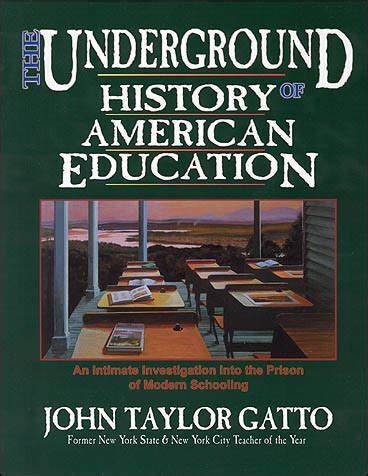
View On WordPress
#noventa y cinco tesis#Juan Calvino#educación obligatoria#Constantino el Grande#sistema adoctrinamiento#Johann Gottlieb Fichte#Esparta#John Taylor Gatto#Prusia#Joseph Lancaster#Martín Lutero#el sistema educativo de Madras#agogé#Horace Mann#educación espartana#Taylorismo#Reforma Protestante#William Torey Harris#Casa de Médici#Henry Ford#papa León X#Fordismo#Johann Tetzel#Aldous Huxley#arzobispo de maguncia#John D. Rockefeller#indulgencias#Andrew Carnegie#purgatorio
0 notes
Text

“Those who speak the same language form a whole that pure nature has linked in advance with a thousand invisible bonds.”
~Johann Gottlieb Fichte
72 notes
·
View notes
Text
45 notes
·
View notes
Text

4 notes
·
View notes
Text

"[…] un tel ordre ne se laisse-t-il saisir dans aucun concept, mais il correspond pourtant à la nature spirituelle particulière, véritablement existante, qui entoure l’homme et dont il procède lui-même, avec toute sa pensée, toute son action et sa croyance en l’éternité de celle-ci, c’est-à-dire le peuple d’où il est issu et dans le cadre duquel il s’est développé et s’est élevé à ce qu’il est aujourd’hui. Car il est certes indubitable que son œuvre, à l’éternité de laquelle il a raison de prétendre, n’est nullement le simple produit de la loi qui régit la nature spirituelle de sa nation, et qu’elle ne s’y réduit pas purement et simplement, mais qu’elle constitue quelque chose de plus qui, en tant que tel, découle immédiatement de la vie originelle et divine ; […]"
Johann Gottlieb Fichte, « Huitième discours », in Discours à la nation allemande (13 décembre 1807)
5 notes
·
View notes
Text

«Que yo quiera ser libre, a la manera expuesta, significa que yo mismo quiero convertirme en aquello que seré. Para ello —y esto es lo más insólito, y a primera vista completamente absurdo, que hay en esta idea— yo debería en cierto sentido ser eso que voy a ser antes de serlo, para así poder convertirme en ello, es decir, debería tener un modo doble de ser, donde el primero contendría la razón de la determinación del segundo. Si observo ahora mi autoconciencia inmediata en la volición, hallo lo siguiente. Yo tengo conocimiento de múltiples posibilidades de acción, entre las cuales, según me parece, puedo elegir la que quiera. Recorro el dominio de tales posibilidades, lo amplío, dilucido sus particularidades, comparo unas con otras y pondero. Finalmente elijo una entre todas, conforme a ella determino mi voluntad, y de esa resolución de la voluntad se sigue la acción correspondiente. Resulta, pues, que yo soy antes, en el puro pensamiento de mi fin, aquello que después, y conforme a ese pensamiento, soy realmente mediante la voluntad y la acción. Yo soy antes como pensante eso que, en virtud del pensamiento, soy más tarde como actuante. Yo me hago a mí mismo: mi ser, mediante mi pensar; mi pensar, mediante el pensar mismo.»
Johann Gottlieb Fichte: El destino del hombre. Ediciones Sígueme, pág. 47. Salamanca, 2011.
TGO
@bocadosdefilosofia
@dias-de-la-ira-1
#fichte#johann gottlieb fichte#el destino del hombre#libertad#ser libre#autoconciencia#posibilidades de acción#conocimiento#determinación de la voluntad#voluntad#volición#pensamiento#pensante#acción#actuante#pensar#idealismo alemán#idealismo absoluto#yo trascendental#filosofía contemporánea#teo gómez otero
3 notes
·
View notes
Photo
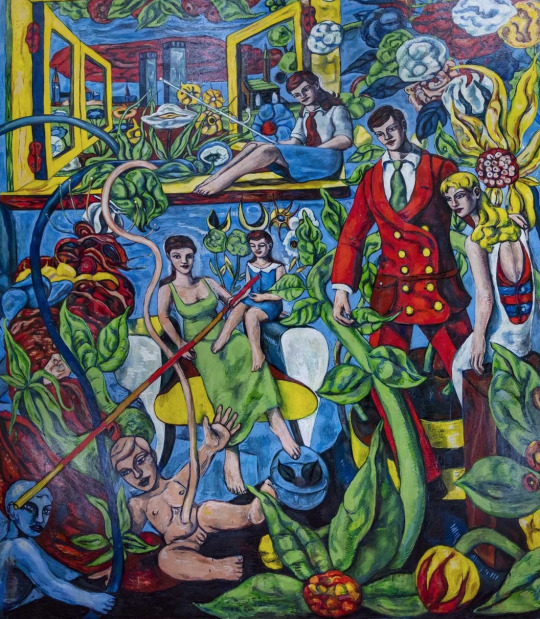
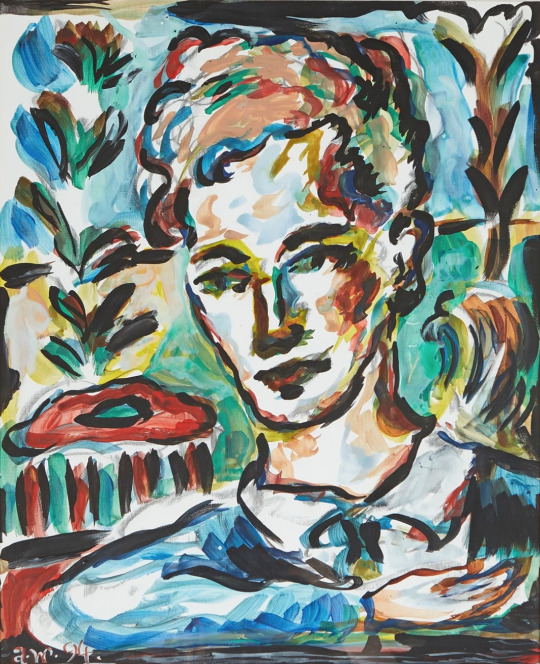


TUBER-BABES (2008), GARDENER (1994), PORTRAIT OF A GIRL & PORTRAIT OF A BOY by Adrian Wiszniewski
If once more we are so circumstanced that we can yield ourselves to that which springs forth as the reality of green, we can carry this so far that the green disappears for us, in the same way as previously the blue as blue disappeared. Here again we cannot say, “a color is spread out before our sight,” but (and I remark expressly that I am telling you of things that everyone can experience for himself if he fulfills the requisite conditions) the soul has instead a peculiar feeling, which can be thus expressed: “I now understand what I experience when I think creatively, when a thought springs up in me, when an idea strikes me: I understand this now for the first time, I can only learn this from the bursting forth of the green all around me. I begin to understand the inmost parts of my soul through external nature when the outer natural impression has disappeared and in its place a moral impression is left. The green of the plant tells me how I ought to feel within myself, when my soul is blessed with the power to think thoughts, to cherish ideas.” Here again an external impression of nature is transmuted into a moral feeling.
—Rudolf Steiner, The Spiritual Beings in the Heavenly Bodies & in the Kingdoms of Nature
The idea of the archetypal plant is a product of spiritual intuition; it is a plant image that can come to life within us; from it numberless plants can be derived which do not as yet exist, but could exist. In someone who has become a sage, laws are not bound to the particular; they are eternal living entities. This is the realm of Imagination, of ideas that are not abstract but creative images. Abstract concepts and ideas may lead to science, but not to wisdom.
—Rudolf Steiner, Supersensible Knowledge: Lecture IX: Wisdom & Health
An appearance has been completely comprehended by the presupposition that it is a product of nature, if all that occurs in it refers back to organization and can be completely explained by the end and aim of this determined organization. For instance, the highest and last manifestation of the organizing power in plants is the seed. Now, this seed is completely explainable from the organization as its end, that is, as the means of propagating the plant; and through this seed the power of organization returns into itself and recommences its career. The act of organization thus never closes, but always rushes along in an endless circle.
—Fichte, The Science of Rights
0 notes
Text
Mages having a guild system is always better than magic schools. First because it demonstrates you have, in fact, Read Another Book; but also because what you think of as a school is only possible in a particular kind of very modern society.
Modern schooling dates to the aftermath of the Napoleonic Wars, when Johann Gottlieb Fichte said “Napoleon beat Germany like we were late on a payday loan, we better brainwash our entire populace to be fit conscripts.” (I’m actually understating it. He actually said education should “aim at destroying free will, so that a student will forever after be unable to act other than as their schoolmaster would wish”. Also that they would believe snow is black if their teacher said so.)
Unless your story is set somewhere like Cheliax or Menzoberranzan, that’s obviously not a likely institution to arise. But a guild is. Guilds are not unions; unions are for collective bargaining by employees, but the members of a guild are their own masters. They not only serve to facilitate apprenticeships, they act as a guarantor of professional competence (think “disbarred” or “lost my medical license”) and also, traditionally, as insurance co-ops.
It’s funny how many people claim to be anti-capitalist, while demonstrating they can’t conceive of labor in any terms but corporate employment.
27 notes
·
View notes